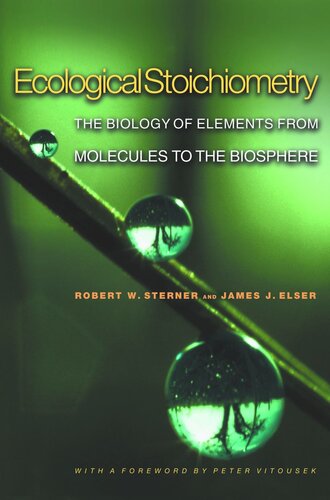

Most ebook files are in PDF format, so you can easily read them using various software such as Foxit Reader or directly on the Google Chrome browser.
Some ebook files are released by publishers in other formats such as .awz, .mobi, .epub, .fb2, etc. You may need to install specific software to read these formats on mobile/PC, such as Calibre.
Please read the tutorial at this link: https://ebookbell.com/faq
We offer FREE conversion to the popular formats you request; however, this may take some time. Therefore, right after payment, please email us, and we will try to provide the service as quickly as possible.
For some exceptional file formats or broken links (if any), please refrain from opening any disputes. Instead, email us first, and we will try to assist within a maximum of 6 hours.
EbookBell Team

4.0
66 reviewsAll life is chemical. That fact underpins the developing field of ecological stoichiometry, the study of the balance of chemical elements in ecological interactions. This long-awaited book brings this field into its own as a unifying force in ecology and evolution. Synthesizing a wide range of knowledge, Robert Sterner and Jim Elser show how an understanding of the biochemical deployment of elements in organisms from microbes to metazoa provides the key to making sense of both aquatic and terrestrial ecosystems.
After summarizing the chemistry of elements and their relative abundance in Earth's environment, the authors proceed along a line of increasing complexity and scale from molecules to cells, individuals, populations, communities, and ecosystems. The book examines fundamental chemical constraints on ecological phenomena such as competition, herbivory, symbiosis, energy flow in food webs, and organic matter sequestration. In accessible prose and with clear mathematical models, the authors show how ecological stoichiometry can illuminate diverse fields of study, from metabolism to global change.
Set to be a classic in the field, Ecological Stoichiometry is an indispensable resource for researchers, instructors, and students of ecology, evolution, physiology, and biogeochemistry.
From the foreword by Peter Vitousek:
?
"[T]his book represents a significant milestone in the history of ecology. . . . Love it or argue with it--and I do both--most ecologists will be influenced by the framework developed in this book. . . . There are points to question here, and many more to test . . . And if we are both lucky and good, this questioning and testing will advance our field beyond the level achieved in this book. I can't wait to get on with it."